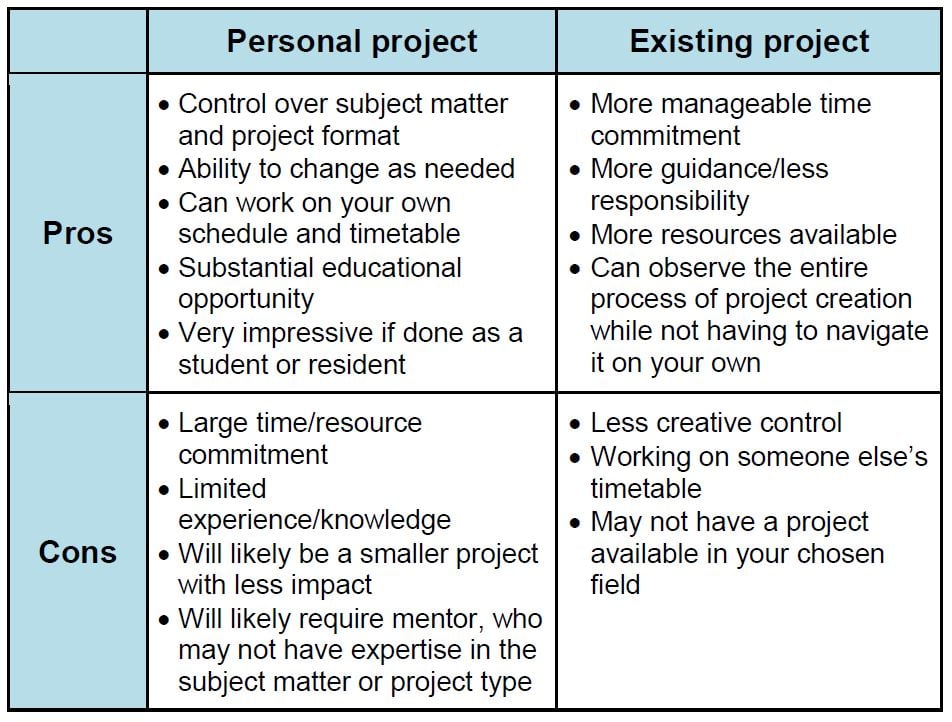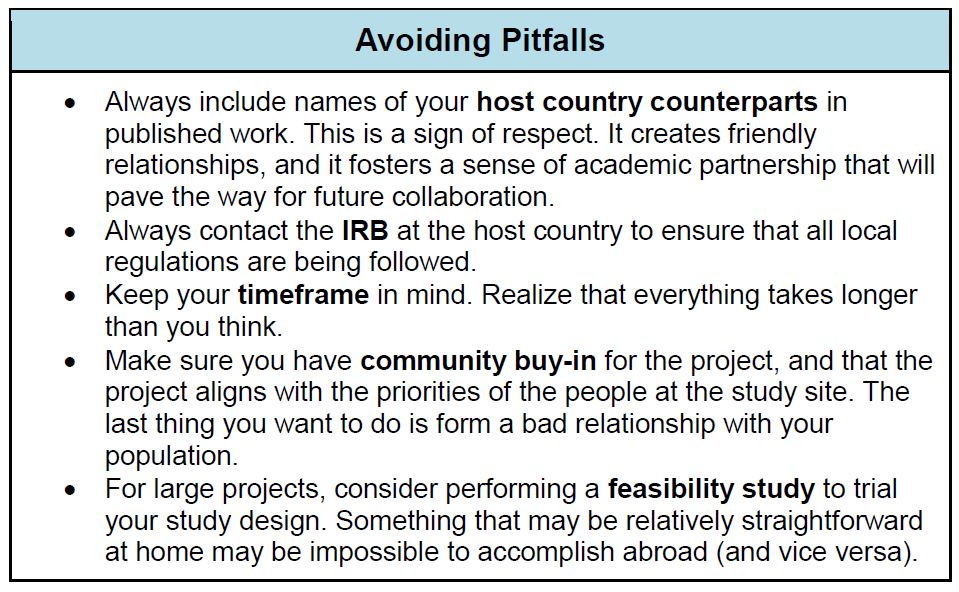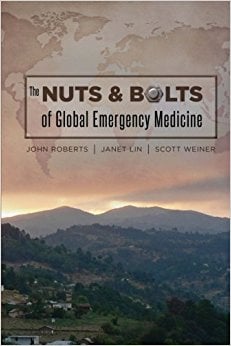Ch 9. Research: How to Choose a Project
Introduction
For medical students and residents contemplating a career in GEM, a project can be a wonderful opportunity to learn more about a specific aspect of our field, gain critical clinical and research skills, and form the foundation of a network of colleagues that you will continue to build upon for the rest of your career. Projects can take many different forms other than the traditional research paper and are limited only by your creativity. This book started as a project between residents and GEM faculty! Projects are a large part of GEM, and although they are extremely important assets that make GEM impactful, they are not absolutely necessary for the medical student or resident. If you do decide to start a project, or join one, remember that you must be imaginative and flexible. Projects rarely go as planned, and the ability to improvise and adapt cannot be overstated.
STEP 1: What do you like?
Given the vast nature of GEM, it can be difficult to come up with a project on your own or even choose a project you would like to join. One approach is to start by exploring the different facets of GEM that exist, and pick a subject matter that interests you. All you have to do is start reading what you enjoy: after all, this is what interests you, right? Another approach is to decide on the type of project that interests you and using this as a guide to the subject matter of your project. Different project styles lend themselves to different types of people, and not everyone enjoys all types.
STEP 2: How do you want to do it?
Will this be your project or will you be aiding on an already existing project? Do you have an idea or vision that you want to explore?
Personal Project:
Starting and completing your own project can be exciting, rewarding, and teach you about every aspect of the process. Designing your own project allows you to be innovative, nimble, and make the project exactly what you want it to be. You will be able to cover the material you find
important, in the way that you deem necessary. However, this is a large undertaking, especially if you have limited experience in project creation. Completing your own project will necessarily be more labor intensive and will likely require substantially more time. If you have never completed a project before, you will likely need guidance and mentorship from someone experienced in the subject matter and type of project that you are interested in. Although this is likely to be out of the realm of possibility for most residents and medical students, it is doable with the correct amount of planning and ambition. Later in this chapter you will find links to resources to help you get started designing your own project depending on the type of project you select.
Existing Project:
A more practical option may be to join an existing project. By playing a supporting role rather than the role of mastermind, you will be gaining several advantages: the time commitment will likely be substantially less, you will have more support, and more resources will be at your disposal. This is often the best option for those just starting out. However, this will require someone else’s ideas to resonate with you, and you will likely not have the same control over the project that you would have over your own. For those who decide to join in on an existing project, your assistance (and free labor) will be appreciated. In turn, you will gain experience, make connections, and possibly have your name on a large published paper.

Considerations for all Projects
Timeframe
Most projects take longer than planned, and it takes experience to become efficient. In the beginning of your GEM career, think small! There is nothing wrong about thinking small. In fact, many times a small project can be the beginning of something much more advanced and encompassing. Furthermore, time constraints of medical school and residency typically do not allow for very extensive projects, so thinking small equates to thinking realistically.
Cultural Sensitivity
Being mindful of the host country’s healthcare landscape is of utmost importance as their resources and problems may require a unique approach.1 Depending on your familiarity with the local culture and standards, you may unwittingly offend or take advantage of those you are trying to help. Knowledge of the host language is also valued resource, but may not be required.
Planning Ahead
You should also account for the time frame that is available to you. Keep in mind that most projects are going to take longer than expected. Typically, at least a month of on-the-ground time commitment in the area of interest is necessary for most projects to be completed.
Funding
Once you have a specific project in mind, you may need to acquire resources and funding. This might seem like a daunting task, but it can make your GEM experience all that much more rewarding. Chapter 10 provides information on this topic.
Research Divisions
Many academic emergency departments have entire divisions dedicated to producing new projects and providing guidance to those that are interested in creating projects. These can be invaluable to help you determine what is feasible and the right way to approach different types of projects. Even if they do not have experience specifically in international research, many of the same principles are common to all projects and research.
Project Types
Case report or Clinical Image
“You diagnosed African Trypanosomiasis!? In California!?” These can be fascinating and fun to research, and are straightforward projects to get your foot in the door. In addition, they require less time/resource commitment and you will likely need less guidance.
Survey or Focused Needs Assessment
“Do mothers in Uganda have adequate prenatal care?” This type of project centers on assessing the availability of a certain aspect of medical care. This is regarded as an easy research approach, but when completed properly, they have the potential to produce useful data. Surveys are realistic for medical students and residents because they result in a large amount of data in a short period of time for a low cost.3
Observational Study
“I wonder how often people in Katmandu, Nepal are dying of sepsis since the earthquake?” Observational studies are studies that don’t require any specific intervention in order to collect data. They can also be completed fairly quickly without having to spend long periods of time in a host country. This is especially true if data gathering has already been done and the study you propose is retrospective. This sort of research must be done in collaboration with the host country and may require an initial visit to see what kind of data they collect on their patients.
Literature Review
“What does the literature say about the proper treatment for cerebral malaria?” This type complies all of the literature on a specific topic. A literature review can be relatively straightforward,
however it can be very tedious so make sure you plan accordingly. Remember that the more specific your question, the more you can narrow down your search.
Manuscript Preparation
“Hey Steve, I have all of this great data showing the efficacy of the new community health worker training on the Thai-Burmese border but I’m too swamped with work to write it up – can you help me out?” This type of project involves the preparation of a written piece only, rather than collecting/analyzing data or developing relationships. It is a useful service that you can provide when the party that collected the data doesn’t have the time or resources to analyze, compile, summarize, and/or publish existing data. This can provide much-needed help to a busy researcher from your home institution, or resource-burdened foreign researchers. You can take advantage of your access to the resources of your home institution to help out researchers in a host country that may not have the means to organize and publish data on their own. You can also offer to translate completed work into English and submit it to a journal. User-friendly guidelines exist for preparing manuscripts can be found at this citation.5
Memorandum of Understanding (MOU)
“I wish that we could rotate at another hospital somewhere in India, but our residency doesn’t have any relationship with institutions there.” An MOU is simply a formal agreement between two or more parties that outlines the terms of a partnership and will govern their expectations and interactions. For instance, MOUs exist between institutions that participate in exchange programs. This is different than research, however can be very impactful by bringing two different groups together over shared interests.
A specific type of MOU is the Global Health Learning Opportunity (GHLO). When a school becomes a part of GHLO, it enters into an agreement to exchange students from other GHLO schools as part of a partnership, like an MOU. Medical students can set up a GHLO account at their medical school and a host country’s institution.
Comprehensive Needs Assessment
“What types of healthcare services are lacking in Cuzco, Peru?” This type of project requires a great effort with a team-based approach in order to obtain timely and accurate information. Typically, this involves an epidemiologically-based assessment of ill health and the identification of what emergency health services are needed.4
Prospective Trial
“What is the optimal resuscitation strategy for septic children in resource-limited settings?” Although this is considered the gold standard for a research study, a prospective trial is a large undertaking. A prospective trial abroad requires a dedicated in-country
team, as well as an understanding of the host countries ethics and IRB process.
Policy Change
“I wonder if we can make Emergency Medicine a boarded specialty in Italy?” To make a policy change abroad, one must dedicate an enormous amount of time and effort. An example of this is establishing EM as a recognized specialty in a country that has yet to have EM residency programs.
STEP 3: Presenting your work
Peer-Reviewed Journals
Although this is the most widely recognized presentation format for a project, peer-reviewed journals are typically heavily scrutinized and have significant competition for a coveted number of available spots. In addition, it may not be the appropriate presentation format for your specific project.
Magazines/Non-peer reviewed
Institutional or national EM magazines are avenues to publish as well, and your work will typically not be subject to the scrutiny of a peer-reviewed journal.
Conferences
No one expects a medical student or resident to present his or her first project in a national or international journal. A noble goal is to present your work as an abstract in a local or international conference. These can provide a more open forum where you can discuss your project with other like-minded colleagues, in addition to gaining recognition for your subject matter.

Other considerations
Service Learning Project (SLP)
An SLP is a charitable service project that meets the needs of a community or population while providing valuable education to those that perform it. They are impactful because they are structured to benefit both the organization receiving the aid, and the group providing it. An MOU is an example of an SLP. You can submit your own idea to the annual AOA Medical Student Service Leadership contest for a chance to receive funding for your project.
Observational Rotations
If you do not feel that a discrete project is something that interests you, or if you merely want to learn more about a particular area of the world, you may want to complete an observational rotation. This can provide you with an understanding of local cultural backgrounds and allow you time to develop a project in the future.2
References
- Kirsch TD, Holliman CJ, Hirshon JM, et al. The development of international emergency medicine: the role of United States emergency physicians and organizations. Acad Emerg Med. 1997; 4:996–1001.
- Arnold JL. International emergency medicine and the recent development of emergency medicine world-wide. Ann Emerg Med. 1999; 33:97–103.
- Kate Kelley, Belinda Clark , Vivienne Brown , John sitzia. Good practice in the conduct and reporting of survey research. International Journal for Quality and Healthcare. 2003;15:261-266.
- Wright J, Walley J. Assessing health needs in developing countries. BMJ.: British Medical Journal. 1998;316(7147):1819-1823.
- MacDonald NE, Ford-Jones L, Friedman JN, Hall J. Preparing a manuscript for publication: A user-friendly guide. Paediatrics & Child Health. 2006;11(6):339-342.





